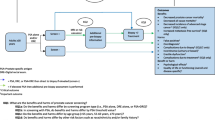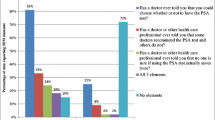Abstract
OBJECTIVE: To determine physicians’ rating of the importance of key facts men ought to know about prostate-specific antigen (PSA) screening and whether there are differences by specialty.
PARTICIPANTS: A nationwide random sample of internists, family physicians, and urologists stratified by physician specialty from The Official ABMS Directory of Board-Certified Medical Specialists 2000 Edition.
MEASUREMENTS: Internists (N=139), family physicians (N=160), and urologists (N=151) were asked to rate how important it is for men to know 17 facts about PSA screening using a 5-point Likert scale.
MAIN RESULTS: Of 769 eligible physicians, 450 responded, for an overall response rate of 59%. Urologists and nonurologists differed in rating how important it was for men to know 9 of the 17 key facts. Eight of the nine statements that urologists and nonurologists disagreed upon concerned facts reflecting uncertainty. Nonurologists were more likely than urologists to rate facts reflecting uncertainty as highly important for men to know. These included statements about prostate cancer risk, screening with PSA, and treatment.
CONCLUSIONS: Despite professional guidelines supporting informed decision making, the importance of facts men ought to know about PSA testing differ by physician specialty. Systematic differences may reflect differences in professional guidelines about PSA testing.
Similar content being viewed by others
References
Burack RC, Wood DP Jr. Screening for prostate cancer. The challenge of promoting informed decision making in the absence of definitive evidence of effectiveness. Med Clin North Am. 1999;83:1423–42.
Coley CM, Barry MJ, Fleming C, Mulley AG. Early detection of prostate cancer, Part I: prior probability and effectiveness of tests. The American College of Physicians. Ann Intern Med. 1997;126:394–406.
Woolf SH. Screening for prostate cancer with prostate-specific antigen: an examination of the evidence. N Engl J Med. 1995;333:1401–5.
Gohagan JK, Prorok PC, Kramer BS, Cornett JE. Prostate cancer screening in the prostate, lung, colorectal, and ovarian cancer screening trial of the National Cancer Institute. J Urol. 1994;152:1905–9.
Prorok P. The National Cancer Institute Multi-Screening Trial. Can J Oncol. 1994;4(suppl 1):98–101.
Schroder FH. The European Screening Study for Prostate Cancer. Can J Oncol. 1994;4(suppl 1):102–9.
Schroder FH, Kranse R, Rietbergen J, Hoedemaeke R, Kirkels W. The European Randomized Study of Screening for Prostate Cancer (ERSPC): an update. Members of the ERSPC, Section Rotterdam. Eur Urol. 1999;35:539–43.
Coley CM, Barry MJ, Fleming C, Fahs MC, Mulley AG. Early detection of prostate cancer. II. Estimating the risks, benefits, and costs. American College of Physicians. Ann Intern Med. 1997;126:468–79.
Brawley OW. Prostate cancer screening: a note of caution. In: Thompson IM, Resnick MI, Klein EA. eds. Prostate Cancer Screening. Totowa, NJ: Humana Press, Inc.; 2001:175–85.
American College of Physicians. Screening for prostate cancer. Ann Intern Med. 1997;126:480–4.
American Cancer Society. Summary of American Cancer Society recommendations for the early detection of cancer in asymptomatic people. In: Cancer Facts and Figures 2001. Atlanta, Ga: National Home Office, American Cancer Society, Inc.; 2001:35.
American Academy of Family Physicians. Introduction to AAFP summary of policy recommendations for periodic health examination. Available at: http://www.aafp.org/policy/camp/apndx_fc.html. Accessed July 10, 2001.
American Urological Association. Prostate-specific antigen (PSA) best practice policy. Oncology. 2000;14:267–72, 277–80.
U.S. Preventive Services Task Force. Guide to Clinical Preventive Services, 2nd ed. Baltimore, Md: Williams and Wilkins; 1996.
Dunn AS, Shridharani KV, Lou W, Bernstein J, Horowitz CR. Physician-patient discussions of controversial cancer screening tests. Am J Prev Med. 2001;20:130–4.
Braddock CH III, Edwards KA, Hasenberg NM, Laidley TL, Levinson W. Informed decision making in outpatient practice: time to get back to basics. JAMA. 1999;282:2313–20.
Moran WP, Cohen SJ, Preisser JS, Wofford JL, Shelton BJ, McClatchey MW. Factors influencing use of the prostate-specific antigen screening test in primary care. Am J Manag Care. 2000;6:315–24.
McKnight JT, Tietze PH, Adcock BB, Maxwell AJ, Smith WO, Nagy MC. Screening for prostate cancer: a comparison of urologists and primary care physicians. South Med J. 1996;89:885–8.
Lawson DA, Simoes EJ, Sharp D, et al. Prostate cancer screening: a physician survey in Missouri. J Community Health. 1998;23:347–58.
Fowler FJ Jr, Bin L, Collins MM, et al. Prostate cancer screening and beliefs about treatment efficacy: a national survey of primary care physicians and urologists. Am J Med. 1998;104:526–32.
Diefenbach PN, Ganz PA, Pawlow AJ, Guthrie D. Screening by the prostate-specific antigen test: what do patients know? J Cancer Educ. 1996;11:39–44.
Mainous AG III, Hagen MD. Public awareness of prostate cancer and the prostate-specific antigen test. Cancer Pract. 1994;2:217–21.
Demark-Wahnefried W, Strigo T, Catoe T, et al. Knowledge, beliefs, and prior screening behavior among blacks and whites reporting for prostate cancer screening. Urology. 1995;46:346–51.
Federman DG, Goyal S, Kamina A, Peduzzi P, Concato J. Informed consent for PSA screening: does it happen? Eff Clin Pract. 1999;2:152–7.
O’Dell KJ, Volk RJ, Cass AR, Spann SJ. Screening for prostate cancer with the prostate-specific antigen test: are patients making informed decisions? J Fam Pract. 1999;48:682–8.
Chan EC, Sulmasy DP. What should men know about prostate-specific antigen screening before giving informed consent? Am J Med. 1998;105:266–74.
Braddock CJ III. Informed consent. In: Sugarman J, ed. Ethics in Primary Care. 20 Common Problems. New York: McGraw-Hill; 2000:239–54.
Abram MB, Ballantine HT, Dunlop GR, et al. The President’s Commission for the Study of Ethical Problems in Medicine and Biomedical and Behavioral Research. Informed consent as active, shared decision making. In: Making Health Care Decisions, the Ethical and Legal Impplications of Informed Consent in the Patient-practitioner Relationship. Vol. 1: Report. Washington, DC: U.S. Government Printing Office; 1982:15–39.
Katz J. The Silent World of Doctor and Patient. New York: Free Press; 1984.
Beauchamp TL, Childress JF. Principles of Biomedical Ethics, 4th ed. New York: Oxford University Press; 1994:120–88.
Faden RR, Beauchamp TL. A History and Theory of Informed Consent. New York: Oxford University Press; 1986.
Sprung CL, Winick BJ. Informed consent in theory and practice. Legal and medical perspectives on the informed consent doctrine and a proposed reconceptualization. Crit Care Med. 1989;17:1346–54.
Hicks RJ, Hamm RM, Bemben DA. Prostate cancer screening. What family physicians believe is best. Arch Fam Med. 1995;4:317–22.
Hoffman RM, Papenfuss MR, Buller DB, Moon TE. Attitudes and practices of primary care physicians for prostate cancer screening. Am J Prev Med. 1996;12:277–81.
Begg CB, Riedel ER, Bach PB, et al. Variations in morbidity after radical prostatectomy. N Engl J Med. 2002;346:1138–44.
Asch DA, Jedrziewski MK, Christakis NA. Response rates to mail surveys published in medical journals. J Clin Epidemiol. 1997;50:1129–36.
Institute of Medicine. Crossing the quality chasm. Available at: http://www.nap.edu/books/0309072808/html. Accessed July 8, 2001.
Barry MJ. Health decision aids to facilitate shared decision making in office practice. Ann Intern Med. 2002;136:127–35.
Author information
Authors and Affiliations
Corresponding author
Additional information
This study was funded by National Cancer Institute grant K08-CA78615, awarded to Dr. Chan as a Clinical Scientist Award. Additional support was provided by NIH grant M01-RR02558, the Clinical Research Center at the University of Texas-Houston.
Rights and permissions
About this article
Cite this article
Chan, E.C.Y., Vernon, S.W., Haynes, M.C. et al. Physician perspectives on the importance of facts men ought to know about prostate-specific antigen testing. J GEN INTERN MED 18, 350–356 (2003). https://doi.org/10.1046/j.1525-1497.2003.20626.x
Issue Date:
DOI: https://doi.org/10.1046/j.1525-1497.2003.20626.x




